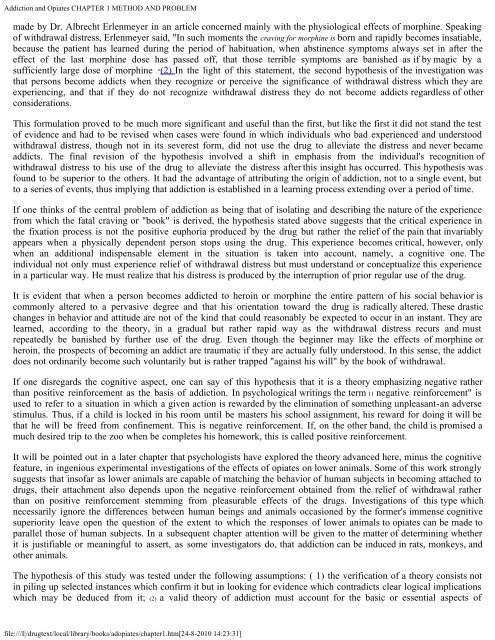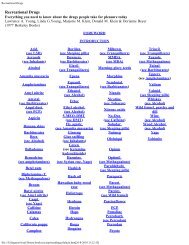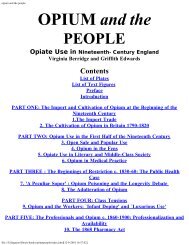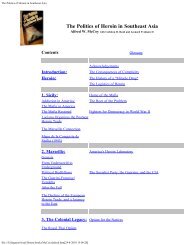Addiction and Opiates
Addiction and Opiates
Addiction and Opiates
Create successful ePaper yourself
Turn your PDF publications into a flip-book with our unique Google optimized e-Paper software.
<strong>Addiction</strong> <strong>and</strong> <strong>Opiates</strong> CHAPTER 1 METHOD AND PROBLEM<br />
made by Dr. Albrecht Erlenmeyer in an article concerned mainly with the physiological effects of morphine. Speaking<br />
of withdrawal distress, Erlenmeyer said, "In such moments the craving for morphine is born <strong>and</strong> rapidly becomes insatiable,<br />
because the patient has learned during the period of habituation, when abstinence symptoms always set in after the<br />
effect of the last morphine dose has passed off, that those terrible symptoms are banished as if by magic by a<br />
sufficiently large dose of morphine ."(2) In the light of this statement, the second hypothesis of the investigation was<br />
that persons become addicts when they recognize or perceive the significance of withdrawal distress which they are<br />
experiencing, <strong>and</strong> that if they do not recognize withdrawal distress they do not become addicts regardless of other<br />
considerations.<br />
This formulation proved to be much more significant <strong>and</strong> useful than the first, but like the first it did not st<strong>and</strong> the test<br />
of evidence <strong>and</strong> had to be revised when cases were found in which individuals who bad experienced <strong>and</strong> understood<br />
withdrawal distress, though not in its severest form, did not use the drug to alleviate the distress <strong>and</strong> never became<br />
addicts. The final revision of the hypothesis involved a shift in emphasis from the individual's recognition of<br />
withdrawal distress to his use of the drug to alleviate the distress after this insight has occurred. This hypothesis was<br />
found to be superior to the others. It had the advantage of attributing the origin of addiction, not to a single event, but<br />
to a series of events, thus implying that addiction is established in a learning process extending over a period of time.<br />
If one thinks of the central problem of addiction as being that of isolating <strong>and</strong> describing the nature of the experience<br />
from which the fatal craving or "book" is derived, the hypothesis stated above suggests that the critical experience in<br />
the fixation process is not the positive euphoria produced by the drug but rather the relief of the pain that invariably<br />
appears when a physically dependent person stops using the drug. This experience becomes critical, however, only<br />
when an additional indispensable element in the situation is taken into account, namely, a cognitive one. The<br />
individual not only must experience relief of withdrawal distress but must underst<strong>and</strong> or conceptualize this experience<br />
in a particular way. He must realize that his distress is produced by the interruption of prior regular use of the drug.<br />
It is evident that when a person becomes addicted to heroin or morphine the entire pattern of his social behavior is<br />
commonly altered to a pervasive degree <strong>and</strong> that his orientation toward the drug is radically altered. These drastic<br />
changes in behavior <strong>and</strong> attitude are not of the kind that could reasonably be expected to occur in an instant. They are<br />
learned, according to the theory, in a gradual but rather rapid way as the withdrawal distress recurs <strong>and</strong> must<br />
repeatedly be banished by further use of the drug. Even though the beginner may like the effects of morphine or<br />
heroin, the prospects of becoming an addict are traumatic if they are actually fully understood. In this sense, the addict<br />
does not ordinarily become such voluntarily but is rather trapped "against his will" by the book of withdrawal.<br />
If one disregards the cognitive aspect, one can say of this hypothesis that it is a theory emphasizing negative rather<br />
than positive reinforcement as the basis of addiction. In psychological writings the term 11 negative reinforcement" is<br />
used to refer to a situation in which a given action is rewarded by the elimination of something unpleasant-an adverse<br />
stimulus. Thus, if a child is locked in his room until be masters his school assignment, his reward for doing it will be<br />
that he will be freed from confinement. This is negative reinforcement. If, on the other b<strong>and</strong>, the child is promised a<br />
much desired trip to the zoo when be completes his homework, this is called positive reinforcement.<br />
It will be pointed out in a later chapter that psychologists have explored the theory advanced here, minus the cognitive<br />
feature, in ingenious experimental investigations of the effects of opiates on lower animals. Some of this work strongly<br />
suggests that insofar as lower animals are capable of matching the behavior of human subjects in becoming attached to<br />
drugs, their attachment also depends upon the negative reinforcement obtained from the relief of withdrawal rather<br />
than on positive reinforcement stemming from pleasurable effects of the drugs. Investigations of this type which<br />
necessarily ignore the differences between human beings <strong>and</strong> animals occasioned by the former's immense cognitive<br />
superiority leave open the question of the extent to which the responses of lower animals to opiates can be made to<br />
parallel those of human subjects. In a subsequent chapter attention will be given to the matter of determining whether<br />
it is justifiable or meaningful to assert, as some investigators do, that addiction can be induced in rats, monkeys, <strong>and</strong><br />
other animals.<br />
The hypothesis of this study was tested under the following assumptions: ( 1) the verification of a theory consists not<br />
in piling up selected instances which confirm it but in looking for evidence which contradicts clear logical implications<br />
which may be deduced from it; (2) a valid theory of addiction must account for the basic or essential aspects of<br />
file:///I|/drugtext/local/library/books/adopiates/chapter1.htm[24-8-2010 14:23:31]





